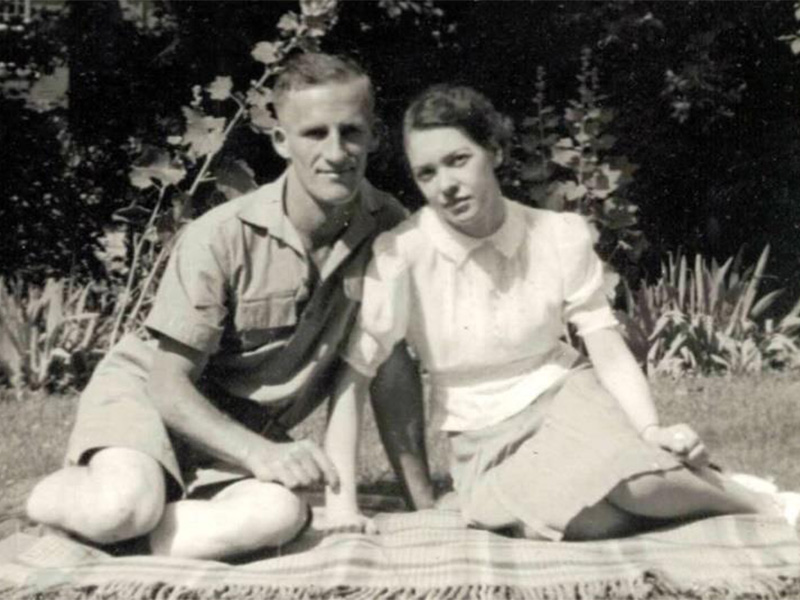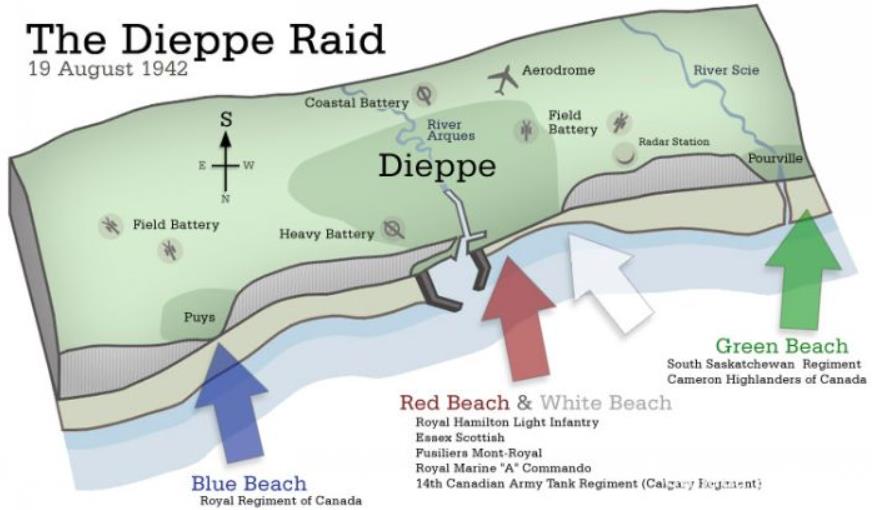Article | Photos: Linda York
I was reminded of my Dad when reading Bruce McRae’s article about his Grandfather Jock which appeared in the Winter 2015/16 issue of KINTAIL – partially his sentence “Like many men who had served in the First and Second World War, he was very reluctant to talk about his experiences.”
My Dad also never talked too much about the war. When he did, to my brother and I when we were young, it sounded like a great adventure. It was only when I was older and talking to Mom one day that she told me how badly Dad was affected by it all.
Mom and Dad were married February 17, 1940; and, on July 22, 1940 Dad left for England with the RHLI (Royal Hamilton Light Infantry).
Dad was the “old guy” as he called himself (age 31); the rest of the men were young – late teens early twenties. After spending time in England training and waiting; he was sent to the Dieppe Raid, Operation Jubilee 1st Battalion on August 19, 1942. History tells us the Dieppe Raid was a disaster; however, there was great heroism also. Dad was wounded in the back and heel with shrapnel, captured there and spent the rest of the war in a German Prisoner of War camp – well except for the times he and comrades escaped and were recaptured. The first time he escaped he was recaptured the first day – bread and water was their reward. The next time they managed to be free for several days. The third time he remained free for several weeks – only getting caught because he tied his shoe laces the opposite way to the German people. Each time they escaped they became more adapt at avoiding capture.
Many times Mom did not know whether he was alive or dead; but, she would continue sending care parcels through the Red Cross; and, eventually he would receive them in the camp. Near the end of the war POWs were forced to march westward across Poland, Czechoslovakia and Germany in extreme winter conditions. When they were liberated at the end of the war, they had to walk all the way back; finally reaching the English Channel where they returned to England; and, for Dad – home to Hamilton, ON. Dad carried that shrapnel in his back for many years where it formed a lump the size of a fist – he finally had it removed.
My mother wrote a poem about their life together, which she only showed me after Dad died in 1988…….
It was on an autumn evening
When to the National I went,
And there at nearly midnight
He asked me for a dance.
I politely accepted
And looked up to see,
A lad in Khaki uniform
As handsome as you please.We danced a few times together
And when the Home Waltz was o’er,
He promised to dance with me again
If I came back next week.
Next week I went back again
And we danced a lot together,
Before the night was over
We had plans to go out together.As the days went by
Our love did grow,
And in a few short months
We walked down the aisle together.
For five long years
We were separated by war,
But the happy day came
When we were together once more.Our home was blessed
With two beautiful children,
This whirlwind romance
Did it last? You may ask.
Yes for forty-eight years
Five months and two days
Till death did us part.

My Mom was Dorothy Bertice MacRae, (1922-2009) born Mt. Buchanan (Point Prim), Prince Edward Island – daughter of Roderick Malcolm MacRae (12 Sep 1880 Heatherdale, PEI – Feb 24, 1946 Hamilton, ON) and Mary Ellen Bishop (21 Jan 1895 White Sands, PEI – 11 Sep 1988 Whitby, ON).
My Dad was Cpl. William “Blake” Brown (1911-1988) Regimental Number B-37281 PoW WWII – camp unknown.
This was Mom’s favorite picture of them. Mom wrote on the back “Spring 1940, Last day Blake was home before he went overseas. Blake took picture”. If you look closely you will see the string Dad held and attached to the camera to snap the picture. Last year at the MacRae Gathering in Ottawa, my cousin Linda MacRae read Dad’s name along with the names of her father and mother, Atwood & Anna MacRae, at the Remembrance Ceremony in front of the Peace Tower. Uncle Atwood and my mother were brother and sister.
Dieppe Raid – Part of the North West Europe Campaign of World War II
Date: 19 August 1942 – Location: Dieppe, France
The Dieppe Raid, also known as the Battle of Dieppe, Operation Rutter during planning stages, and by its final official code-name Operation Jubilee, was an Allied attack on the German-occupied port of Dieppe during the Second World War. The raid took place on the northern coast of France on 19 August 1942. The assault began at 5:00 a.m., and by 10:50 a.m. the Allied commanders were forced to call a retreat. Over 6,000 infantrymen, predominantly Canadian, were supported by The Calgary Regiment of the 1st Canadian Tank Brigade and a strong force of Royal Navy and smaller Royal Air Force landing contingents. Of the 6,086 men who made it ashore, 3,367 (almost 60%) were either killed, wounded or captured.
The Royal Hamilton Light Infantry landed 582 soldiers that morning. Only 211 returned to England that afternoon, 109 of them wounded. 197 had been killed and 174 had become prisoners-of-war, including 85 wounded.

https://en.wikipedia.org/wiki/Dieppe_Raid http://www.canadaatwar.ca/photos/dieppe/dieppe_map.jpg
http://www.canadaatwar.ca/content-53/world-war-ii/the-dieppe-raid/
http://www.rhli.ca/dieppe/dieppebattle.html
http://www.rhli.ca/dieppe/dieppehamiltonmonument.html
